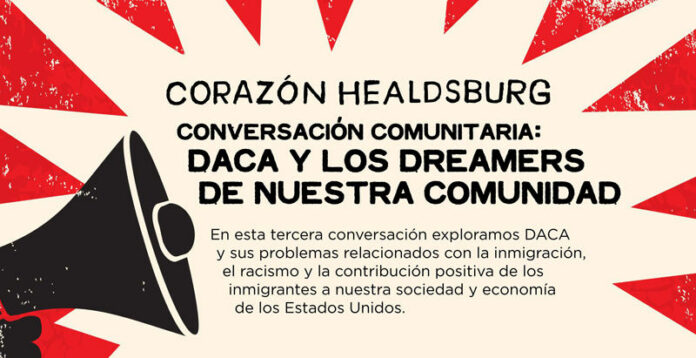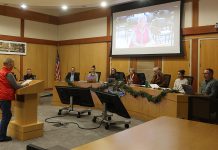Corazón Community Conversation provides information on DACA, what it means and how to apply
In the third installment of the virtual Corazón Healdsburg “Community Conversation” series, a group of panelists and Corazón members discussed the Deferred Action for Childhood Arrivals (DACA) program in a live webinar on July 1 and shared stories about their experience with the program and other key information.
Panelist Rafael Vasquez, the Santa Rosa Junior College Extended Opportunity Programs and Services Coordinator, said there are currently around 40 junior college students who are interested in applying, yet lawyers are advising that folks wait until after the Nov. 3 election to apply due to the uncertainty the program may face.
DACA is an immigration policy that allows some undocumented individuals who have been brought to the country as children to receive a renewable two-year period of deferred action from deportation and become eligible for a U.S. work permit. Under DACA, individuals can also obtain a driver’s license and a social security card. The program faced uncertainty prior to the recent 5-4 Supreme Court decision rejecting President Donald Trump’s efforts to end DACA.
Vasquez, who helps students apply for DACA, and has his own podcast about the program, said while many students are interested in applying, after speaking with lawyers, they’re suggesting individuals wait to apply until after the November election.
“It’s better to start getting your paperwork together but do not apply until after the November elections because if Donald Trump is reelected what he’s going to do is continue the process (of removing DACA). The Supreme Court didn’t say it was illegal for him to remove the program, but they said he did not follow correct procedures, so they said that as long as he follows the correct procedures, he could still eliminate the DACA program,” Vasquez said.
Nevertheless, Vasquez explained the lengthy set of requirements for applying for DACA.
“Who qualifies and who doesn’t? The person who is trying, or is considering applying for DACA, has to have come to the United States before turning 16 and before the 15th of June of 2007 and has to prove every 90 days that they were present in the United States from June 15, 2007 until the present day and specifically in June of 2012, they also have to have proof that they were here.
“They cannot have had any type of valid visa during that time period of 2012 because if they do, they are no longer qualified,” Vasquez said. “They need to be under 31 years of age and if they are older than 18, they have to have their high school diploma or their GED. If they are older than 18 and they never graduated from high school they can go to a community college or another center, which will help them prepare for the GED, and they can take classes starting now and then someone can officially give them proof that they are taking these classes for GED.”
He said if you have a medical marijuana card it’s better not to apply even if you meet the requirements because as soon as immigration notices that you are admitting to smoking marijuana then the DACA application will be rejected and they’ll start the deportation process. He said the same is true for people who’ve had DUI’s.
“It doesn’t mean they have to have found you guilty, it can simply be an accusation or arrest for this,” he said. Vasquez said folks in this situation should speak with a lawyer.
The panel of speakers, Vasquez, Corazón’s Angie Sanchez and Vanesa Valdiva, Healdsburg High School graduate, Griselda Madrigal, Los Angeles Unified School district history teacher, Angelica Reyes, and coordinator for the Paula Crisostomo Dream Center in Los Angeles, Melissa Avila, also discussed the benefits and drawbacks of DACA, and noted that it’s not a permanent solution. Some also spoke candidly about their experience with the program.
While it does provide more opportunity for young students, recipients reported that there is a level of anxiety that comes with the program as well as a clear disparity between how citizens and those with DACA are treated.
Madrigal, a Healdsburg resident, came to the United States with her parents when she was eight and attended Healdsburg schools from fourth to 12th grade. She applied for DACA while she was attending Santa Rosa Junior College (JC).
“I graduated from Healdsburg High School and went to the JC where I transferred to Sonoma State, but it wasn’t until I was at the JC that I could apply for the DACA program,” Madrigal said. “At first we were a little suspicious about it and we didn’t know what that would mean if we gave them all of our information and what they would do with that information. The President tried to remove DACA and that caused a lot of anguish, a lot of anxiety, which we are always facing, worrying about when this program is going to end. Even though we won this battle with the Supreme Court, we’re still in limbo and that is what it means to be a dreamer (students or children who receive DACA are often called dreamers).”
Madrigal said you always have to be vigilant and behave better than citizens or face the possibility of being deported. “Even though we have DACA at the end of the day, it doesn’t mean the same as a more permanent solution from the systems that keep attacking us,” she said.
Valdiva said there is also the ever-present fear of putting your family at risk when applying for DACA, adding to the already stressful situation.
“To have those feelings as a child or as an adolescent is very difficult and painful because your parents are always going to encourage you, but what’s going to happen to them? Are they going to keep living in fear until this government decides to start to change the rules again, so this is really difficult, it really hits all of us deeply and I hope it’s one of many conversations that we have,” Valdiva said.
Reyes, who helps coordinate a Los Angeles “Dream center,” a place that offers resources, information, and help with college and DACA applications and financial aid for high school students, is a DACA recipient and said it hasn’t been easy.
“When I was little my parents told me that I was undocumented. When I was little, I didn’t really understand what that meant, but I just knew it meant I had to behave. It was more when I was in high school and I was applying to universities that I started noticing the difference of how undocumented people and citizens were being treated and the opportunities that they had,” Reyes said.
She said despite DACA and the California Dream Act, which provides funds for undocumented students for college, it’s been an “uphill battle.”
“It’s been a pretty uphill battle, but it’s been also very satisfying that we have the support of our community and that we keep fighting for our rights. It doesn’t feel that good to be always trying to prove that you deserve to be here and that you’re a human being and that you’re doing all of this for the community,” she said.
Valdiva said it’s hard for some people to see the disparities that are apparent in schools among the Latinx community. She shared her experience in high school as an English learner.
“Unfortunately, people can’t always see this, but when I was in high school I was in an English as a second language program and I remember when our last high school year was getting close and no one ever talked to us or asked us if we were going to college or if we were to go on a field trip to UC Davis, etc. We were never included in these offers,” Valdiva said.
That is where the Dream Center comes in. Reyes, who manages the Dream Center at Lincoln High School in South Los Angeles, said the center is a repository for resources for parents, teachers and students. She said they provide information, scholarships, empowerment and whatever resources students need “to move forward in their lives.”
While there are resources for aspiring college students, Sanchez asked the group what has to happen next in order to create a more permanent solution for students/dreamers.
Reyes reminded folks that while those with DACA cannot vote, it doesn’t mean they can reach out to their local representative.
“Although we can’t vote, it doesn’t mean we can’t advocate and talk with our politicians,” Reyes said.
Madrigal said it’s important to continue this kind of open conversation with the community, not only to educate people, but to let others know what options are available to them.
“Education is the key to everything. Facilitating these conversations is very important,” she said.
Sanchez reiterated the importance of filling out the 2020 census, which plays a role in determining funding amounts for schools, hospitals and other important community resources. Sanchez said that Corazón can help residents fill out their census if needed. She added that they will also make the DACA information that Vasquez reviewed available on their website.
To view the July 1 webinar in its entirety, visit: https://www.facebook.com/CorazonHealdsburg.









